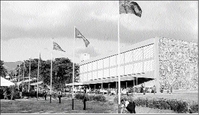Socialaffirmation: Giving power to communities
Published: Sunday | December 13, 2009

As part of UWI, Mona's homecoming celebrations, a flag-raising ceremony and university parade of alumni, staff and students will take place on Thursday, February 15 at the Assembly Hall. - File
In the last three decades, the rate of murder has been increasing at an alarming pace in Jamaica. Today, Jamaica has one of the highest murder rates in the world. Clement Branche and Sophia Morgan, researchers in the department of sociology, psychology and social work at the University of the West Indies (UWI), Mona, have undertaken a social affirmation project aimed at understanding the level of interpersonal and community violence in Jamaica, and the problems of relationship and values that have been a persistent feature of Jamaican society.
The project examines difficulties and opportunities faced by various groups in using available collective resources and values in the construction of robust collective selves, sufficient to meet the challenges of everyday life at the level of the community and beyond.
Historical experiences and research in all the social sciences have shown that people are right when they say the source and correction to most of our problems rest at the level of values, family relations, community relations and action.
The social affirmation project is about the power of the community. It is about the importance of community development in dealing with the problems and challenges of daily life. It attempts to discover and establish existing strengths of various communities and explores how these strengths can be developed and shared between communities.
tapping into history
Jamaica has a long history of spontaneous and successful community development and this project attempts to tap into that history and help communities, groups and individuals rediscover strengths and take advantage of inherent and historical potentialities.
Community strengths are identified in several ways. Some of the more important ways are by our values, our relationships, how we care for and guide the young, our ability to effectively produce and adapt to demands and our resilience. There are also the positive stories we share that unite us and give us a sense of identity, enabling us to establish a relationship to something good and enduring that extends beyond ourselves.
community factors
Researchers are identifying community factors that contribute to the development of the young, of boys and girls, of men and women in the community. They are identifying the values and aspirations of the community that reveal what its residents ideally hope for and what they define as good and valuable.
The social affirmation project is funded by an initial contribution of US$50,000 provided by the Canadian International Development Agency.
Clement Branche is a sociologist and social psychologist who studies the role of community as a cause and solution to social problems in the Caribbean, particularly with respect to self, identify and violence. Sophia Morgan is an organizational psychologist with research interest in groups and community dynamics and the relationship of these to psychological resilience and well -being.
